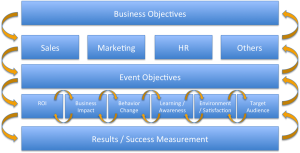Background
The fundamental principle of the ROI Methodology
Meetings and events create value to stakeholders by influencing the behavior of the participants. People do something what they have not done before and as a result of attending the event. Thinking and feeling does not count, only physical behavior towards a desired outcome. This simple and universal fact is the fundamental principle of the ROI Methodology.
[hr height=”30″ style=”zigzag” line=”default” themecolor=”1″]
Background to ROI Methodology
The ROI Methodology is a further development of Donald Kirkpatrick’s model first published in 1959 – focused on training and development. Jack Phillips and the ROI institute Inc. www.roiinstitute.net made the model operational through practical tools and guiding principles in the 1980’s.
More than 35.000 have since been trained and over 3000 certified in the application of the methodology in 54 countries and more than 20 disciplines, including meetings and events. The Methodology is explained in more than 60 books, most of them written by Jack and Patti Phillips and various co-authors.
The Event ROI methodology is a further development focused on the meetings and events industry and became an industry standard for measuring the effectiveness of meetings and events.
Planning and Measurement
The ROI Methodology was first thought of as an evaluation tool only, but it is easy to understand how it became a planning model at the same time. In order to measure results, there must be clear and measurable objectives, otherwise measurement is meaningless. How do you know if results are good or bad if you don’t have objectives?
The context sets the scene
An event doesn’t create value on its own. How does it support other company strategies and programs (HR, Sales, Marketing), and how do other initiatives support the event? The strategic context of the event aligns its outcome with other activities towards a common goal. Only when the context is clear, can we start setting objectives for the event.

